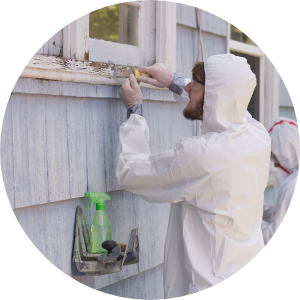Our Water > Lead
Protecting Drinking Water from Lead Contamination
No level of lead consumption is safe, especially for children. Lead contamination in drinking water can impair learning, development, and behavior, with lifelong consequences. Clean Wisconsin is pushing for state and local funding to test for lead and replace outdated service lines, ensuring clean water for every community.
Jump to Section
Explore Our Approach
Overview
The Urgent Need to Address Lead in Drinking Water
Although banned in new plumbing decades ago, lead pipes still deliver water to thousands of homes across Wisconsin. Because lead has no taste, color, or smell—and symptoms of exposure often go unnoticed—many families don’t realize they’re at risk.
This is a solvable problem. Clean Wisconsin is calling for stronger statewide policies and consistent investment to speed up lead pipe replacement and expand testing—especially in communities most affected.
4.5%
of children under 6 tested positive for lead, ranking Wisconsin 10th nationally
150,000
lead water service lines remain in use across Wisconsin
0%
is the safe level of lead, according to the EPA
10
Wisconsin ranks 10th in the nation for the number of lead-poisoned children
200,000+
children diagnosed with lead poisoning from 1996-2016
Health Impact
What’s at Risk?
Children’s health is at risk. Kids absorb lead at 5 to 10 times the rate of adults. Even low levels can cause:
- Cognitive and behavioral issues
- Nervous system damage
- Learning disabilities
- Stunted growth and hearing loss
- Increased risk of school dropout and delinquent behavior
Adults are vulnerable, too. Lead exposure can lead to cardiovascular problems, kidney damage, reproductive issues, and cognitive decline in older adults.
economic toll
The Cost of Inaction
Replacing lead pipes nationwide could cost up to $80 billion—expenses that may fall on homeowners and underfunded communities. But the cost of doing nothing is even higher.
Wisconsin could save $7 billion in healthcare, special education, and criminal justice expenses by eliminating lead poisoning. It could also gain $21 billion in increased lifetime earnings from improved graduation rates and long-term productivity.
KEY INITIATIVES
What Are We Advocating For?
Clean Wisconsin is a leading voice advocating for state efforts to prevent lead contamination. As a member of the Coalition on the Lead Emergency (COLE) since 2020, Clean Wisconsin has been instrumental in pushing for legislative and policy changes, particularly focusing on the disproportionate impact on children of color and low-income families.
We’ve supported efforts to ensure the Milwaukee Health Department responds faster when children are identified with elevated blood lead levels.

Supporting the Leading on Lead Bill (SB 48) (2018)
Clean Wisconsin successfully advocated for legislation that would help private property owners access funding to replace their lead service lines in municipalities across Wisconsin.

Voicing Support for Tougher EPA Standards
Clean Wisconsin has long called on the EPA to adopt a health-based standard for lead in drinking water, require proactive replacement of lead service lines, and strengthen testing and monitoring requirements. In 2024, the EPA revised its Lead and Copper rule to require all that lead service lines be replaced within 10 years.

Pushing for Funding in the Governor’s Budget
Clean Wisconsin worked to ensure that funding for lead pipe replacement was included in the 2019–2023 state budget cycles.

Expanding Local Programs
Clean Wisconsin supports funding for lead paint abatement and energy efficiency upgrades in households that face multiple environmental health risks and high energy costs.
SIGN UP
Join the Fight Against Lead Pollution
Sign Up For Email Updates
"*" indicates required fields